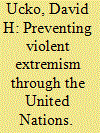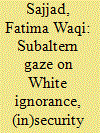| Srl | Item |
| 1 |
ID:
158717


|
|
|
|
|
| Summary/Abstract |
In January 2016, late in his term as Secretary-General, Ban Ki-moon introduced a Plan of Action to Prevent Violent Extremism (PVE). The approach promised to bring balance to multilateral counterterrorism by adding much-needed focus on the drivers of mobilization into violence. Highly arguable in theory and with great potential against the online recruitment efforts of groups such as Islamic State in Iraq and Syria, the PVE agenda has nonetheless found enemies at the United Nations—both among member states and within the Secretariat. Errors committed in the Plan of Action's rollout made the new approach hostage to the very limitations and tensions that it was intended to resolve. PVE also rests on a shaky conceptual foundation and has been further stultified by the intensely political setting in which it was to be implemented. The future of this well-intended approach therefore looks at risk, even bleak. This article traces and explains the rise and likely fall of PVE at the United Nations, bringing to light a number of sobering insight into the possibilities and limits of multilateral counterterrorism.
|
|
|
|
|
|
|
|
|
|
|
|
|
|
|
|
| 2 |
ID:
187997


|
|
|
|
|
| Summary/Abstract |
The use of international peacebuilding as a delivery vehicle for preventing violent extremism (PVE) initiatives is a recent and pivotal development in United Nations (UN) counterterrorism strategy. However, existing research has not considered the contradictions that emerge when international organizations transition to new peacebuilding approaches such as PVE. Further, it remains unclear whether and how intervening organizations overcome these contradictions. Based on forty-seven interviews with UN, government, and nongovernmental organization officials in Kyrgyzstan and New York this article critically analyzes the shift to PVE as an underlying strategic approach to UN peacebuilding and the mismatch between external expectations and local priorities. Interview narratives feature ambiguity in conceptions of foundational PVE concepts and in how interveners reference a menu of drivers for violent extremism according to project requirements. This article argues that ambiguity is strategically tolerated and employed, whereby not clarifying the terms of engagement with (sub-)national counterparts supports external agendas and achieves a basic unity of purpose by permitting counterparts increased managerial latitude to satisfy self-interests.
|
|
|
|
|
|
|
|
|
|
|
|
|
|
|
|
| 3 |
ID:
192989


|
|
|
|
|
| Summary/Abstract |
In this article, I, as a subaltern, offer a reverse gaze on White security plans to rescue the world from the tide of violent extremism. Violent extremism has been identified as a global security threat by the United Nations, which announced a Plan of Action to combat the threat in 2016. Education has been considered a valuable tool for preventing violent extremism. In 2017, UNESCO published a policy guide explaining how education can be used to prevent violent extremism. This article offers a critique of the UNESCO policy guide, using the construct of White ignorance as explained by Charles Mills and Jennifer Mueller’s Theory of Racial Ignorance. This critique, coming from a location (Pakistan) where education has been under intense White scrutiny since 9/11, owing to its alleged link with violent ideologies, provides an inverse perspective on the problem of violent extremism. Using Mills’s concept of the epistemology of ignorance, I argue that international security policies view security as maintenance of White hegemony and refuse to listen to the people labelled as a security problem by White epistemic authorities. I contend that it is the White security policy that needs to be educated to prevent violence and maintain durable security.
|
|
|
|
|
|
|
|
|
|
|
|
|
|
|
|